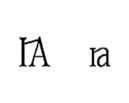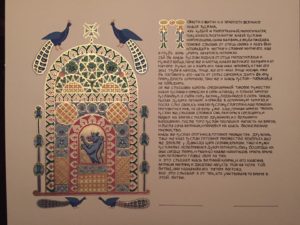This is the sevent scroll text I’ve done (for those keeping score – the fourth one has not yet been given out, so no blog post yet). It is for a Tyger of the East, probably the East Kingdom’s most prestigious award. This is the first text I’ve done for a scroll of this level, and I was honored to have been asked to do a text for a scroll this important. As it worked out, this was the most fun text I’ve done yet.
The text was based on ЖИТИЕ АЛЕКСАНДРА НЕВСКОГО (Life of Alexander Nevsky). While the original story was written in the 1280s, I was working from a 15th Century version (as transcribed in 2011) found at: http://lib.pushkinskijdom.ru/Default.aspx?tabid=4962#. Alexander Nevsky is a historical figure, but in the 15th Century, when Russia was becoming unified as a single nation, Nevsky was used as a propaganda hero, the Russian leader who beat the West. So the text is kind of over-the-top, lauding Nevsky. It worked beautifully adapted to an SCA scroll text.
ПОВѣСТИ О ЖИТИИ И О ХРАБРОСТИ ВЕЛИКАГО КНѦЗЯ РγСЛАНА
Азъ хγдый и многогрѣшный, малосъмысля, покγшаюся писати житие кнѧзя Рγслана Новгородцева, сына Балфара, а внγка Рандала. Понеже слышах от отець своихъ и радъ бых исповѣдалъ честное и славное житие его. Аще и грγбъ есмь γмомъ начатокъ положю.
Съй бѣ кнѧзь Рγслан родися от отца милостилюбца и мγжелюбца, паче же и кротка, кнѧзя великаго Балфара и от матере Лγны. Но и взоръ его паче инѣх человекъ, и глас его — акы трγба в народѣ, лице же его — акы лице Иосифа, иже бѣ поставилъ его египетьскый царь втораго царя въ Египтѣ, сила же бѣ его — часть от силы Самсоня, и далъ бѣ емγ премγдрость Соломоню, Тако же и кнѧзь Рγслан — побѣжая, а не побѣдимъ.
Се же слышавъ король средиземный таковое мγжество кнѧзя Рγслана и помысли в собѣ: «Поидγ и плѣню землю Рγслановγ». И събра силγ великγ, подвижеся в силѣ тѧжцѣ, пыхая дγхомъ ратным. И прииде в Оспориннγю Землю, и посла слы своя, къ кнѧзю Рγсланγ, глаголя: «Аще можеши противитися мнѣ, то се есмь γже зде, плѣнѧя землю твою».
Рγслан же, слышав словеса сии, разгорѣся сердцемъ, и пошел на врагов с малою дрγжиною, и с большими войскамию. После того Рγслан поспешил напасть на врагов, и была сеча великая, и перебил их кнѧзь бесчисленное множество.
Кнѧзь же Рγслан оплъчися, готовил множествѣ дрγжинѣ. Тако же кнѧз Рγслан готовил множество храбрых, ѧко же древле γ Давыда царя силнии, крѣпции. Тако и мγжи Рγслановы исполнишася дγхом ратнымъ, бѧхγ бо сердца их, акы сердца лвомъ, и рѣшя: «О кнѧже нашь! Нынѣ приспѣ врѣмя нам положити главы своя за тя».
А это слышал Кнѧзь Великий Кенрик, и его Кнѧгиня Великая Авелина, и десѧтово Авгγста 7524 на поле той битвы, они назначили его Тигром Востока.
Все это слышал я от тех, кто γчаствовал в то время в этой битве.
English translation:
THE TALE OF THE LIFE AND BRAVERY OF GREAT KNIAZ RUSLAN
I, who is skinny and sinful, lacking great wit, have dared to write of the life of Kniaz Ruslan Novgorodcev, son of Balfar, grandson of Randal. But as I’ve heard from my fathers I am glad to tell of his honest and great life. And though I am simple of mind, still, I will begin.
The kniaz was born of a father who was kind and beloved of the people, but most importantly who was gentle, King Balfar, and of mother Luna. And handsome was he like no other, and his voice – like the trumpet of the people, and his face – like the face of Joseph whom Pharaoh made a second king of Egypt, and his strength was as a portion of the strength of Samson, and he was gifted with the wisdom of Solomon. And so with Kniaz Ruslan – victorious and undefeatable.
Having heard of the greatness of Kniaz Ruslan, the King of the Middle thought to himself: “I shall go and conquer Ruslan’s land”. And he gathered a great host, and moved with an enormous strength, belching forth a fighting spirit. And having reached the Debatable Lands, he sent his envoy to Kniaz Ruslan, saying “If you can, defend, for I am here and will destroy your lands.”
Ruslan, having heard these words, grew wroth and went to meet the enemy with his champions and his great armies. And then Ruslan hurried to attack the enemies and there was a great battle and the Kniaz defeated a countless number of them
Kniaz Ruslan prepared, and trained many champions. And Kniaz Ruslan trained a multidue of brave warriors, who, like in the days of King David were brave and strong. And the men of Ruslan were filled with a warrior spirit, and their heards were like the hears of lions, and they said “Our Kniaz! The time has come to give our lives for you!”.
And of this heard King Kenric and his Qeen Avelina, and on the tenth of August, 7524* after the creation of the world, or 2016 CE, or 51 AS, on the field of that battle, they named him a Tyger of the East.
All of this I heard from those who participated at that time in that battle.
*Medieval Russia used the Byzantine Calendar, in which 2016 would be approximately 7524.
Final Scroll (C&I by Vettorio Antonello):
Some calligraphic notes:
Period Russian used some additional characters and did not use some standard moder characters. A good overview can be found here: http://en.wikipedia.org/wiki/Early_Cyrillic_alphabet
In period Russian, the letter “y” did not exist. Instead, either of the following symbols was used:![]() (the one on the left is a combination of the letter o and the letter izhitsa, the one on the right is a single character digraph – I recommend using the digraph). Since this symbol is not found in standard computer fonts, the greek character gamma (γ) is used in the text. One of the correct symbols should be substituted in the scroll.
(the one on the left is a combination of the letter o and the letter izhitsa, the one on the right is a single character digraph – I recommend using the digraph). Since this symbol is not found in standard computer fonts, the greek character gamma (γ) is used in the text. One of the correct symbols should be substituted in the scroll.
In period Russian, the letter “я” did not exist. In the middle of a sentence it’s replaced by the “small yus”, written “ѧ”, at the ends of a sentence it is written using the “Iotated A”, which looks like this:  (upper and lower case). I made the small yus replacements. Anywhere a “я” appears, the iotated A should be used instead.
(upper and lower case). I made the small yus replacements. Anywhere a “я” appears, the iotated A should be used instead.
